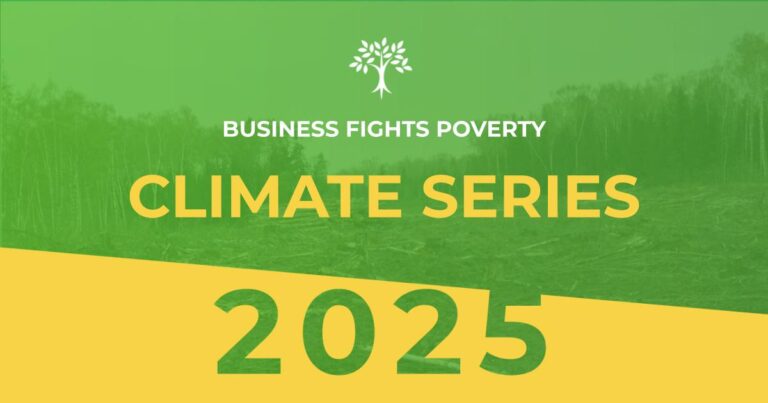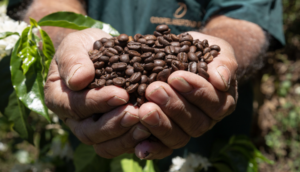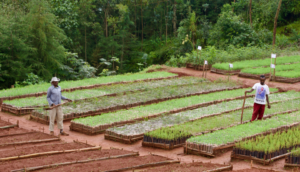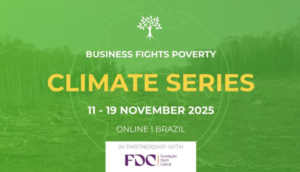Extreme weather and climate events such as droughts, cold waves, and heavy precipitation, along pest and disease and land degradation, are negatively impacting farmer livelihoods throughout the world. This is not only an environmental crisis – it is an economic and social one.
Soil health degradation, water pollution and biodiversity collapse are undermining the foundations of rural livelihoods and global food systems. Without healthy ecosystems, there can be no viable farming. To ensure long-term agricultural resilience, greater investment and commitment to agroecology practices are needed.
As we move closer to COP30 in Brazil, the conversations must move from hopes and dreams towards system action. Agroecology offers the most coherent framework to deliver that change – integrating environmental science with social justice and economic viability. It recognises that biodiversity, soil health, and farmer agency are interdependent, and that transitioning to sustainable food systems requires policy incentives, market access, and strong institutional support for producers.
For example, incentivizing increasing biodiversity through diversification and reducing the use of synthetic fertilizers and pesticides through policies and market regulations. By adopting agroecology practices that focus on soil health – such as reduced tillage, cover cropping, and crop rotation – and incorporating social and economic dimensions, we can build sustainable and productive farming systems for future generations.
To remain resilient and adaptable to changing circumstances, Fairtrade International, the non-profit, multi-stakeholder organisation founded in 1997 with the mission of promoting fairer trading conditions, has focused its climate and environment efforts towards supporting transformations within value chains that regenerate ecosystems and support producers. This reflects a recognition that climate mitigation alone is not enough – resilience must come from diversified farms and equitable value distribution.
Our role is now to accompany producer organisations in a long-term transition towards agroecology – a framework guided by principles rather than a fixed set of practices. These principles include, for example, recycling nutrients, valuing local knowledge, fostering diversity, and strengthening producer autonomy. Although these practices take time to implement and yield results, they are effective in protecting nature, conserving biodiversity, and restoring degraded land, all the while producing healthy, sustainable food products.
Fairtrade’s Sustainable Banana Organisations project in the Dominican Republic and Peru is one successful example of how farmers are increasing their productivity, building business management skills, while also including more women in these opportunities, using agroecology practices.
A collaboration between French retailer Carrefour, the French Development Agency, and Fairtrade producer network CLAC in the Latin America and Caribbean region, the project currently supports 11 small-scale banana cooperatives and more than 1,000 farmers, along with their families and community members.
The project’s activities include building micro-factories to produce organic fertilizers and biological pesticides from bioferments and organic residues that not only improve farmers’ ecological footprint but also help to reduce costs. Plus, workshops to train farmers on identifying and preventing the spread of harmful fungal diseases, increasing soil fertility, and testing soil diversification. It also incorporates climate change adaptation practices to increase yields and improve their livelihoods. Smallholder producers are also equipped with management, administration, and marketing skills as part of a system-wide transformation.
In addition, women banana farmers have participated in innovative teaching modules from Fairtrade’s Women’s School of Leadership, which raises awareness about gender issues, supports women in producer organisations, and enhances their self-confidence and skills. Module topics have included human rights, leadership, negotiation, and political participation.
The project, which runs through 2027, is valorising local knowledge, considering local conditions, while also integrating traditional, experimental, and scientific knowledge. Furthermore, it exemplifies how agroecology promotes social justice and protects farmers and workers, including women, while also strengthening and elevating their roles in farm management.
In fact, banana farms in the Dominican Republic and Peru prove that agroecology practices build the resilience of family farmers and rural communities and boost local economies and markets.
Fairtrade is acting now to scale agroecology as a route to a resilient, fair and climate resilient food system. But this transformation requires bold policy choices and investment – from governments preparing for COP30 to companies embedding biodiversity and farmer empowerment at the heart of their sourcing. Protecting nature and people are inseparable goals – and the transition must start on farms, with producers equipped to lead it.
This article is part of the Business Fights Poverty Climate Series with Fundação Dom Cabral (FDC) taking place during COP30 Climate Summit in Belém, Brazil.










